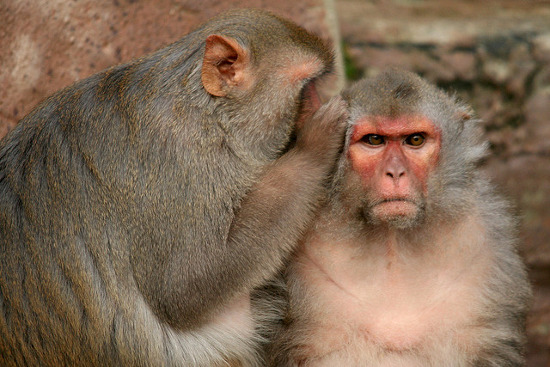Deciphering altruism
Scientists have identified 'kind' cells in monkeys, opening up the hope of studying the neurological foundation of altruism.
Why are animals not selfish? Why do animals that seem to be inferior to humans in many ways seem to be more kind than us? The results of previous studies by Miami University (USA) experts showed that the crafty starving family did not want to pull the knife at the same time, and the mouse did not care for the food if it had to harm other mice. In the new study, published in the journal Nature Neuroscience, primitive good instincts in animals may have evolved into human selflessness today, according to Duke University scientist Michael Platt (neuroscience scientist). America).
However, it is not easy to understand the mechanism of brain activity associated with this personality. When people perform generous acts like donations to charity, reward signals appear in the brain, just as when people eat chocolate or do something that makes the body enjoy. However, it is clear that people have a different feeling between bringing pleasure to themselves and benefiting people. This makes scientists once again question the way the brain encodes an individual's unselfish, good actions toward others.

Research shows that animals also have morality and understanding
In an attempt to find an answer, expert Platt and his colleagues taught a group of brown monkeys to play a simple game whereby they were chosen to reward themselves with a glass of fruit juice or to sit next to them. Not surprisingly, most of the subjects poured their own juice. But when choosing between putting other monkey juice or not giving anything, they prefer to give co-juice instead of sitting still. In the process, experts observed electroencephalic signals emitted from the area they suspected played a role in altruism. The cerebral cortex, called the cornered forehead, which played a role in the reward process, was active when the monkey chose his cup of water. It seems that this is the area for central autism, which values itself.
However, some cells in the brain region called the anterior cortex are activated when one monkey gives water to another monkey. And experts believe that those cells are responsible in part for creating primitive forms of empathy.
Platt experts think of the possibility that this region can also operate in the same way as humans, and can play a role in coding experiences indirectly from the joys and sorrows of others. It is the emotional experience of the subject that triggered the altruistic behavior in humans, according to Platt's analysis. The new discovery may play an important role in decoding why many animals (including humans) express kindness without requiring any benefit from the opponent. Assessing the importance of the study, neuroscience expert Matthew Rushworth of Oxford University commented that this is a great achievement in the effort to improve the view of hidden neurological activities in the key aspect social awareness.
- How human personality is due to brain structure
- 'Child one' is afraid of risk and easy to worry too much
- The father of Egypt learned to die of strange disease
- 10 most intelligent animals
- the selfish will hepl we have more happiness?
- Long-lasting disaster, people are selfless?
- Science proves: the poor are more generous than the rich
- Psychological testing shows that
- Deciphering code makes millions fear
- Decode the fragile genome
- The mystery of the phenomenon
- 'Deciphering the snowman' mystery
 'Fine laughs' - Scary and painful torture in ancient times
'Fine laughs' - Scary and painful torture in ancient times The sequence of numbers 142857 of the Egyptian pyramids is known as the strangest number in the world - Why?
The sequence of numbers 142857 of the Egyptian pyramids is known as the strangest number in the world - Why? History of the iron
History of the iron What is alum?
What is alum?